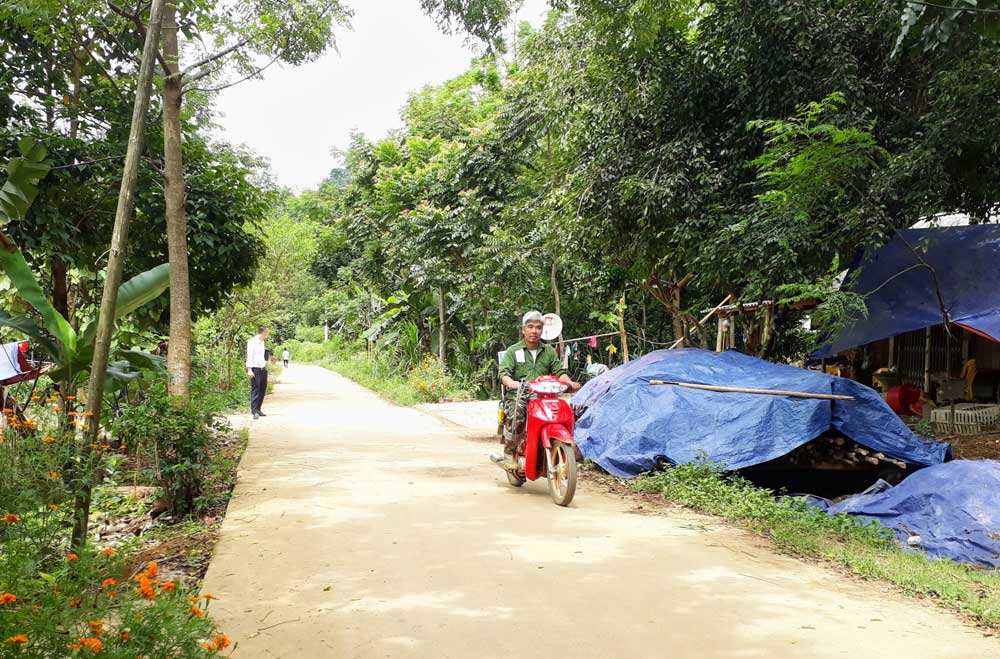
(HBO) – In the campaign on studying and following President Ho Chi Minh's ideology, morality and style, many good models and practices have appeared in the locality. Da Bac district has actively multiply the good economic models, which it considers a driving force for hunger eradication, poverty reduction and socio-economic development.

Over the years, people in Da Bac
district have donated land and labour to build rural roads. Photo taken in Bai
hamlet, Cao Son commune.
In an effort to overcome difficulties to develop the economy and improve the
livelihood, many households have sought and found suitable economic models, one
of which is cage fish farming in the Da River reservoir. Forestry in combination
with livestock raising is also a choice of many for its high economic
efficiency. In Doan Ket commune, there are several successful husbandry models
such as a farm of Luong Van Viet with over 200 goats, or buffalo and cow
raising farms run by Lo Van Phuong and Lo Van Quy. Taking advantage of their
forests, many households raise animals under the forest canopy, for example the
families of Luong Van Hoa and Luong Van Kim in Giap Dat commune.
Studying and following President Ho Chi Minh's ideology, morality and style not
only creates a driving force for the upland district of Da Bac in
socio-economic development and national security, but also helps strengthen
solidarity and mutual help among local communities. A number of agencies and
organisations in the district have sponsored disadvantaged students. Locals
have set up self-help groups to assist each other in farming work as well as in
daily activities, which operate effectively in the communes of Bao, Bang, Dat
1, Dat 5 and Thang Lang.
Bui Van Luyen, Secretary of the district's Party Committee has stressed that in
the coming time, the district will strive to multiply good models and
practices, so as to realise the set goals. At the same time, Da Bac will
continue to promote educational activities targeting young generations, cadres
and party members. Agencies, units and localities should strictly implement
work regulations, keep close monitoring of the situation at the grassroots
level in order to timely seek solutions for arising problems./.
In the spirit of "Party members go first, the people follow”, all households of Party members in the Doan Ket sub-region in Da Bac town, Da Bac district, voluntarily removed gates and fences, and donated land when the road expansion project passed through their properties. Inspired by their example, 68 households in the sub-region quickly followed suit, contributing over 1,400 sq.m of residential and perennial cropland to widen the main road through the residential area. The exemplary role of Party members in Doan Ket stands as a shining example of studying and following President Ho Chi Minh’s thought, morality, and lifestyle.
The Hoa Binh provincial People's Committee held a monthly meeting on May 29 to assess the implementation of socio-economic development tasks in the first six months of 2025, the progress of key projects, and some other important issues.
During his lifetime, President Ho Chi Minh always expressed his deep affection and special concern for children and youth. He once emphasized: "Caring for and educating children well is the responsibility of the entire Party and the entire people”; "First of all, the family (i.e. grandparents, parents, siblings) must do this job well”. "the Party Committees…, the Children’s Committee, the Youth Union, the education sector, and all related organizations must have specific plans to ensure children grow healthier and more progressive”. His teachings has been remaining valuable and serving as the guiding principles in the work of protecting, caring for, and educating children. In line with this ideology, Hoa Binh Province has continuously been prioritizing and investing resources in the well-being of children in recent years.
Mr. Nguyen Phi Long, the alternate Member of the Party Central Committee and Secretary of the Provincial Party Committee chaired the meeting of the Standing Committee of the Provincial Party Committee to provide opinions on several investment projects within the province. There was the attendance of Ms. Bui Thi Minh, the Permanent Deputy Secretary of the Provincial Party Committee and Chairwoman of the Provincial People’s Council; Mr. Bui Đuc Hinh, the Deputy Secretary of the Provincial Party Committee and Chairman of the Provincial People’s Committee and other members of the Standing Committee; the leaders from other departments, agencies, and some localities.
The Standing Board of the Vietnam Fatherland Front (VFF) Committee of Hoa Binh province held a meeting on May 28 to honour outstanding village elders, village heads, and reputable individuals from local ethnic minority and religious communities.
In mid-May, the provincial Museum organised an exhibition named "Duoi la co Dang Cong san Viet Nam quang vinh” (Under the flag of the glorious Communist Party of Vietnam). This meaningful activity took place in the joyful atmosphere to celebrate the country's major holidays and the Party congresses at all levels for the 2025-2030 term, towards the 14th National Party Congress.



